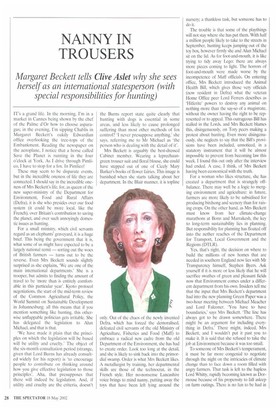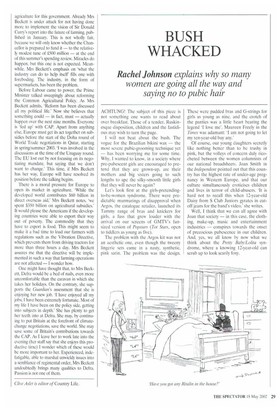NANNY IN TROUSERS
Margaret Beckett tells Clive Aslet why she sees herself as an international statesperson (with special responsibilities for hunting)
IT's a grand life, in the morning, I'm in a market in Cannes being shown by the chef of the Palme cifOr how to choose asparagus; in the evening, I'm sipping Chablis in Margaret Beckett's oakily Edwardian office overlooking the tree-tops of the Embankment. Reading the newspaper on the aeroplane, I notice that a horse called Save the Planet is running in the four o'clock at York. As I drive through Pimlico, I have to stop for a fox. In Pimlico!
These may seem to be disparate events, but in the incredible oneness of life they are connected. I should say in the incredible oneness of Mrs Beckett's life, for, as queen of the new super-ministry of the Department for Environment, Food and Rural Affairs (Defra), it is she who presides over our food system (it could be more local, like the French), over Britain's contribution to saving the planet, and over such annoyingly domestic issues as hunting.
For a small ministry, which civil servants regard as an elephants' graveyard, it is a huge brief. This being the government that it is, what some of us might have expected to be a largely national remit — sorting out the woes of British farmers — turns out to be the reverse. Even Mrs Beckett sounds slightly surprised as she explains, We are one of the main international departments.' She is a trooper, but admits to finding the amount of travel to be 'more than is entirely comfortable in this particular year'. Kyoto protocol negotiations, the start of the mid-term review of the Common Agricultural Policy, the World Summit on Sustainable Development in Johannesburg; all this means that if you mention something like hunting, this otherwise unflappable politician gets irritable. She has delegated the legislation to Alun Michael, and that is that.
'We have made it plain that the principles on which the legislation will be based will be utility and cruelty.' The object of the six-month consultation period (strange, given that Lord Burns has already consulted widely for his report) is 'to encourage people to contribute on thinking around how you give effective legislation to those Aha, that presupposes that there will indeed be legislation. And, if utility and cruelty are the criteria, doesn't the Burns report state quite clearly that hunting with dogs is essential in some areas, and less likely to cause prolonged suffering than most other methods of fox control? 'I never presuppose anything.' she says, referring me to Mr Michael as 'the person who is dealing with the detail of it'.
Mrs Beckett is arguably the best-dressed Cabinet member. Wearing a leprechaungreen trouser suit and floral blouse, she could have stepped out of one of Cicely Mary Barker's books of flower fairies. This image is banished when she starts talking about her department. In the Blair manner, it is topline only. Out of the chaos of the newly invented Defra, which has forced the demoralised, defeated civil servants of the old Ministry of Agriculture, Fisheries and Food (Maff) to embrace a radical new cadre from the old Department of the Environment, she has had to create order. Look too long at the detail, and she is likely to sink back into the primordial swamp. Order is what Mrs Beckett likes. A metallurgist by training, her departmental skills are those of the technocrat, in the French style. Her no-nonsense Lancashire voice brings to mind nanny, putting away the toys that have been left lying around the nursery; a thankless task, but someone has to do it.
The trouble is that some of the playthings will not stay where she has put them. With half a million people likely to take to the streets in September, hunting keeps jumping out of the toy box, however firmly she and Alun Michael sit on the lid. As for foot-and-mouth, it is like trying to tidy away Lego: there are always more pieces coming to light. The horrors of foot-and-mouth were made worse by the incompetence of Maff officials. On entering office, Mrs Beckett introduced the Animal Health Bill, which gives those very officials (now resident in Defra) what the veteran Home Office peer Lord Ferrers describes as `Flitlerite. powers to destroy any animal on nothing more than the say-so of a magistrate, without the owner having the right to be represented or to appeal. This outrageous Bill has stalled in the Lords, and Mrs Beckett blames this, disingenuously, on Tory peers making a protest about hunting. Even more disingenuously, she neglects to say that the Bill's provisions have been included, unnoticed, in a statutory instrument that it will be almost impossible to prevent from becoming law this week. I found this out only after the interview had ended. A case, I think. of Mrs Beckett having been economical with the truth.
For a woman who likes structure, she has created a department that is strangely offbalance. There may well be a logic to merging environment and agriculture: in future, farmers are more likely to be subsidised for producing birdsong and scenery than for raising crops. On the other hand, as Mrs Beckett must know from her climate-change marathons at Bonn and Marrakesh, the key to long-term sustainability lies in planning. But responsibility for planning has floated off into the nether reaches of the Department for Transport, Local Government and the Regions (DTLR).
Yes, that's right, the decision on where to build the millions of new homes that are needed in southern England now lies with Mr Transparency himself, Stephen Byers. Ask yourself if it is more or less likely that he will sacrifice swathes of green and pleasant fields now that Environment comes under a different department from his own. Insiders tell me that the input that Mrs Beckett's department had into the new planning Green Paper was a two-hour meeting between Michael Meacher and Lord Falconer. 'You have to have boundaries,' says Mrs Beckett. 'The line has always got to be drawn somewhere. There might be an argument for including everything in Defra.' There might, indeed, Mrs Beckett, and I wouldn't put it past you to make it. It is said that she refused to take the job at Environment because it was too small.
To someone of Mrs Beckett's temperament, it must be far more congenial to negotiate through the night on the intricacies of climate change than to face down a room filled with angry farmers. That task is left to the hapless Lord Whitty, rapidly becoming known as Dormouse because of his propensity to fall asleep on farm outings. There is no fun to be had in
agriculture for this government. Already Mrs Beckett is under attack for not having done more to implement the vision of Sir Donald Curry's report into the future of farming, published in January. This is not wholly fair, because we will only know whether the Chancellor is prepared to fund it — to the relatively modest tune of £500 million — at the end of this summer's spending review. Miracles do happen, but this one is not expected. Meanwhile. Mrs Beckett's emphasis on 'what the industry can do to help itself fills one with foreboding. The industry, in the form of supermarkets, has been the problem.
Before Labour came to power, the Prime Minister talked sweepingly about reforming the Common Agricultural Policy. As Mrs Beckett admits, 'Reform has been discussed all my political life.' Now she believes that something could — in fact, must — actually happen over the next nine months. Everyone is 'fed up' with CAP. Apart from anything else, Europe must get its act together on subsidies before the start of the Doha round of World Trade negotiations in Qatar, starting in spring/summer 2003. 'I was involved in the discussions at the time of the Uruguay round. The EU lost out by not focusing on its negotiating mandate, but saying that we don't want to change.' This time, if Mrs Beckett has her way, Europe will have resolved its position before the talking begins.
There is a moral pressure for Europe to open its market in agriculture. 'While the developed world contributes $60 billion in direct overseas aid,' Mrs Beckett notes, 'we spent $350 billion on agricultural subsidies.' It would please the Americans if the developing countries were able to export their way out of poverty. The commodity that they have to export is food. This might seem to make it a bad time to load our farmers with regulations such as the Vibration Directive, which prevents them from driving tractors for more than three hours a day. Mrs Beckett assures me that the directive will be implemented in such a way that farming operations are not affected — I wonder how.
One might have thought that, to Mrs Beckett, Defra would be a bed of nails, even more uncomfortable than the caravan in which she takes her holidays. On the contrary, she supports the Guardian's assessment that she is enjoying her new job. 'I have enjoyed all my jobs; I have been extremely fortunate. Most of my life I have been on the policy side, getting into subjects in depth.' She has plenty to get her teeth into at Defra. She may, by continuing to put Britain at the forefront of climatechange negotiations, save the world. She may save some of Britain's contributions towards the CAP. As I leave her to work late into the evening (her staff say that she enjoys this productive time) I wonder which of these would be more important to her. Experienced, indefatigable, able to marshal unwieldy issues into a semblance of regimental order, Mrs Beckett undoubtedly brings many qualities to Defra. Passion is not one of them.















































































 Previous page
Previous page